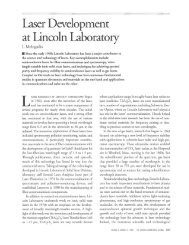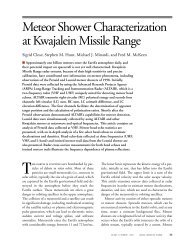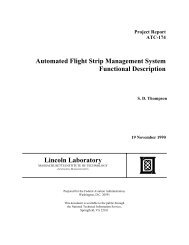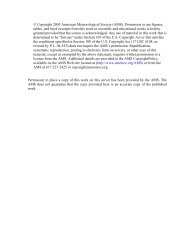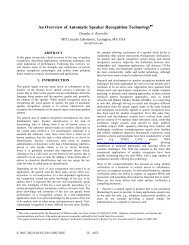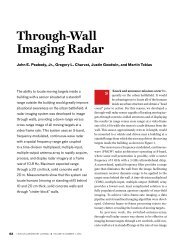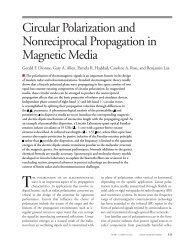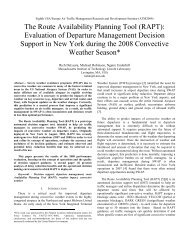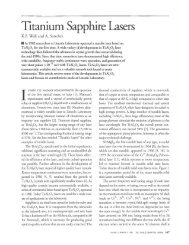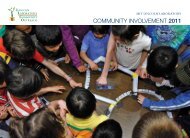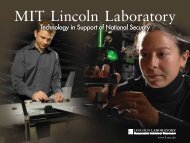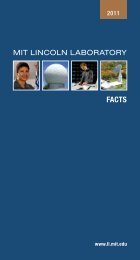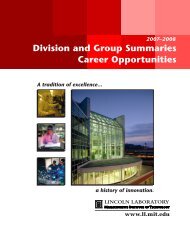2011 Annual Report - MIT Lincoln Laboratory
2011 Annual Report - MIT Lincoln Laboratory
2011 Annual Report - MIT Lincoln Laboratory
You also want an ePaper? Increase the reach of your titles
YUMPU automatically turns print PDFs into web optimized ePapers that Google loves.
<strong>Laboratory</strong> involvement<br />
Diversity and Inclusion<br />
The broad range of experiences and perspectives<br />
of the staff strengthens <strong>Lincoln</strong> <strong>Laboratory</strong>’s ability<br />
to develop multifaceted, innovative approaches to<br />
problems. Fostering a work environment that supports<br />
such diversity is core to the <strong>Laboratory</strong>’s continued<br />
success. Ongoing initiatives are promoting a workplace<br />
that both seeks and appreciates the diverse talents<br />
and ideas of employees.<br />
Special Diversity Presentations<br />
at <strong>Lincoln</strong> <strong>Laboratory</strong><br />
Disability Etiquette—Challenging Our Assumptions<br />
about People with Disabilities in the Workplace<br />
In January <strong>2011</strong>, the Diversity and Inclusion Office<br />
hosted a special presentation on disability awareness<br />
and etiquette. Michael Muehe, executive director of the<br />
Cambridge Commission for Persons with Disabilities,<br />
discussed how to conduct workplace interactions with<br />
people with disabilities.<br />
My Life as a Tuskegee Airman<br />
James A. Sheppard served with the 100th Fighter<br />
Squadron of the Army Air Force during World War II.<br />
The squadron trained at the Tuskegee Army Air Field<br />
in Alabama, and they, along with 996 other men who<br />
graduated from the program there, were known as the<br />
Tuskegee Airmen, the first African-American military<br />
pilots, navigators, and bombardiers. In February <strong>2011</strong>,<br />
to a full house in the <strong>Laboratory</strong>’s auditorium, Mr.<br />
Sheppard recounted his experiences flying missions<br />
over Europe and reflected on the post-war opportunities<br />
afforded to him because of his membership in<br />
this historic group of courageous combat airmen.<br />
<strong>Lincoln</strong> <strong>Laboratory</strong> Technical Women’s<br />
Network (LLTWN)<br />
To promote the retention and achievement of women<br />
technical staff, LLTWN provides a forum for sharing<br />
strategies for success and a mentoring program that<br />
fosters career development. To acquaint staff with<br />
technology developments, monthly meetings often<br />
feature presentations by women researchers from<br />
<strong>Laboratory</strong> technical groups.<br />
48 <strong>2011</strong> <strong>Annual</strong> <strong>Report</strong><br />
<strong>Lincoln</strong> <strong>Laboratory</strong> New Employee<br />
Network (LLNEN)<br />
LLNEN helps new employees transition from their<br />
previous environments to the <strong>Laboratory</strong> and the<br />
region. By providing a social network for new<br />
employees, LLNEN encourages the retention of<br />
talented individuals. LLNEN also facilitates participation<br />
in professional development and community<br />
outreach opportunities.<br />
In 2010, at an event coordinated by LLNEN,<br />
rotating teams of <strong>Laboratory</strong> volunteers spent<br />
three days helping Habitat for Humanity in Bedford,<br />
Mass achusetts, renovate a farmhouse and build two<br />
new homes that will be made available for moderateincome<br />
families.<br />
<strong>Lincoln</strong> <strong>Laboratory</strong> Hispanic and<br />
Latino Network<br />
Through monthly meetings, mentoring, and other activities,<br />
the newly formed Hispanic and Latino Network<br />
(LLHLN) supports educational and professional development<br />
for its members, encourages involvement in<br />
community outreach activities, and fosters awareness<br />
of the Hispanic culture.<br />
Mentorship Programs<br />
Recognizing the importance strong mentorships have<br />
on improving employee development and retention,<br />
<strong>Lincoln</strong> <strong>Laboratory</strong> initiated four mentorship programs<br />
in <strong>2011</strong>. The New Employee Guides program focuses<br />
on acquainting employees with their groups, divisions,<br />
or departments during their early months at the<br />
<strong>Laboratory</strong>. Staff can later choose to participate in<br />
more specialized mentoring programs:<br />
■ Early Career Mentoring provides a six-month,<br />
one-on-one mentorship to help technical and administrative<br />
professionals with early career development.<br />
■ Circle Mentoring uses small discussion groups<br />
led by experienced employees to address topics<br />
relevant to professional and career growth.<br />
■ By partnering a new assistant group leader with an<br />
experienced group leader, the New Assistant Group<br />
Leader Mentoring helps technical staff members<br />
transition into their new responsibilities.<br />
OPPOSITE: The<br />
<strong>Lincoln</strong> <strong>Laboratory</strong><br />
Technical Women’s<br />
Network organized a<br />
multi-station “science fair”<br />
as the December Science<br />
on Saturday event.<br />
Shown here are many<br />
of the volunteers from<br />
across the <strong>Laboratory</strong><br />
who made this event a<br />
successful experience<br />
for local children.



